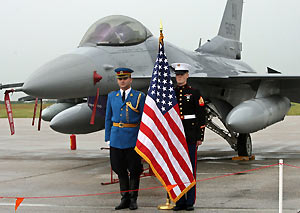Beijing has lodged a solemn objection with Washington on its agreement to
sell 66 advanced fighter jets to Taiwan, Foreign Ministry spokesman Liu Jianchao
said in Beijing on Friday.
 |
|
| File
photo shows two U.S. F-16 military airplanes at the Batajnica
military airport near Belgrade June 23, 2006. [Reuters] |
|
"We urged the US side to abide by the three joint communiques between China
and the United States ... and not sell arms to the island to avoid damaging
peace and stability across the Straits as well as Sino-US relations," Liu said
in a statement.
A Taiwanese delegation proposed the procurement of the F-16C/D fighters
during an annual military meeting with Washington earlier this month, the
Taiwan-based China Times reported.
"The United States has given its nod to the sale of 66 F-16C/D Block 52s,"
the paper said, without naming a source.
It will be the biggest arms deal Washington has offered Taiwan since 2001,
when US President George W. Bush agreed to provide the island with eight
diesel-powered submarines, 12 P-3C submarine-hunting aircraft and an improved
version of Patriot missiles, the paper said.
But in Washington, Bush reiterated on Thursday that the US position on the
Taiwan question is very clear: that the US Government will continue to adhere to
the three joint communiques between the United States and China and is opposed
to any attempt to unilaterally change the status quo across the Taiwan Straits.
He made the remark when meeting Guo Boxiong, vice-chairman of the Central
Military Commission, at the White House.
Guo is the highest ranking military officer from China to visit the United
States since 2001. He is on a six-day visit that will end on Saturday.
At the meeting, Guo noted the current relationship between the two armed
forces is the best in recent years, and the prospect will be brighter with joint
efforts.
Bush said he actively supports closer ties between the two armed forces and
would like to see more military exchanges and visits.
Deepening relationship between the two armed forces is "in the interest of
peace and stability in East Asia and the world," he said.
During a separate meeting with Stephen Hadley, Bush's national security
adviser, on Thursday, Guo expressed the hope the United States will properly
handle the Taiwan question, stop upgrading its military ties with the island and
halt sales of advanced weapons to it, so as not to send the wrong signal to
secessionists there.